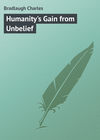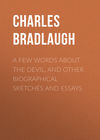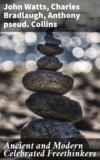Buch lesen: «Ancient and Modern Celebrated Freethinkers», Seite 12
CLAUD ARIAN HELVETIUS
If France, at the present day, has not reason to be proud of its "leading man," it has in former times produced those minds that shed lustre upon the country, and who, by their literature, add immortality to its renown. During the eighteenth century, when religious persecution and intolerance were rampant throughout Europe, France furnished men to check oppression and expose superstition, while others followed to lay the foundation of excellence and greatness in the examination and cultivation of its true source – the mind. Heivetius sought to direct men's attention to self-examination, and to show how many disputes might be avoided if each person understood what he was disputing about. "Helvetius on the Mind" is a work that ought to be read widely, and studied attentively, especially by "rising young men," as it is one of those Secular works too rarely found among our literature.
Claud Arian Helvetius was born in Paris in the year 1715. After his preparatory studies, he was sent to the College of Louis le Grand, having for his tutor the famous Poree, who bestowed additional attention upon Heivetius, perceiving in him great talent and genius. Early in life Heivetius formed the friendship of some of the leading minds of France, Montesquieu being his intimate friend. Voltaire, too, sought his correspondence when at the age of twenty-three, calling him his "Young Apollo," and his "Son of Parnassus." The first literary attempts of Helvetius consisted of poetry – "Epistles on Happiness," which appeared as a posthumous production, with the "lavish commendations" of Voltaire. After ten years' thought and study Helvetius in 1758, published a work entitled "De L'Esprit," which brought upon him a great amount of persecution. The Parliament of Paris condemned it, and Helvetius was removed from the office he held of "Maitre d'Hotel to the Queen." Voltaire remarks: – "it is a little extraordinary that they should have persecuted, disgraced, and harassed, a much respected philosopher of our days, the innocent, the good Helvetius, for having said that if men had been without hands they could not have built houses, or worked in tapestry. Apparently those who have condemned this proposition, have a secret for cutting stones and wood, and for sewing with the feet… I have no doubt that they will soon condemn to the galleys the first who shall have the insolence to say, that a man cannot think without his head; for, some bachelor will tell him, the soul is a pure spirit, the head is nothing but matter: God can place the soul in the nails, as well as in the skull, therefore I proscribe you as impious."
During the persecution raised against him, Helvetius visited England in 1764. In 1765 he visited Prussia, being well received by Frederick, in whose place he lodged. Voltaire strongly advised Helvetius to leave France in these words: – "In your place, I should not hesitate a moment to sell all that I have in France; there are some excellent estates in my neighborhood, and there you might cultivate in peace the arts you love." About this period Hume became acquainted with Helvetius, whom he styles, in writing to Dr. Robertson, "a very fine genius and worthy man." In 1765, Helvetius returned from Prussia, and retired to his estate at Vore. The sight of misery much affected him; and when relieving distress, he enjoined strict secrecy. Sometimes, when told he relieved those undeserving his aid, he would say, "If I were a king I would correct them, but as I am only rich and they are poor, I do my duty in relieving them." An attack of gout in the head and stomach terminated his life in December, 1771, in the fifty-sixth year of his age.
In "De L'Esprit, or, Essays on the Mind," chap. I.. Helvetius makes the following remarks on the "Mind considered in itself": —
"We hear every day disputes with regard to what ought to be called the Mind; each person delivers his thoughts, but annexes different ideas to the word; and thus the debate is continued, without understanding each other. In order, therefore, to enable us to give a just and precise idea of the word Mind, and its different acceptations, it is necessary first to consider the Mind in itself. We consider the Mind either as the effect of the faculty of thinking, and in this sense the Mind is no more than an assemblage of our thoughts, or, we consider it as the very faculty of thinking. But in order to understand what is meant by the Mind, in the latter acceptation, we ought previously to know the productive causes of our ideas. Man has two faculties; or, if I may be allowed the expression, two passive powers whose existence is generally and distinctly acknowledged. The one is the faculty of receiving the different impressions caused by external objects, and is called Physical Sensibility. The other is the faculty of preserving the impressions caused by those objects, called Memory; and Memory is nothing more than a continued, but weakened sensation. – Those faculties which I consider as the productive causes of our thoughts, and which we have in common with beasts, would produce but a very small number of ideas, if they were not assisted by certain external organizations. If Nature, instead of hands and flexible fingers, had terminated our wrist with the foot of a horse, mankind would doubtless have been totally destitute of art, habitation, and defence against other animals. Wholly employed in the care of procuring food, and avoiding the beasts of prey, they would have still continued wandering in the forests, like fugitive flocks. It is therefore evident that, according to this supposition, the police would never have been carried in any society to that degree of perfection, to which it is now arrived. There is not a nation now existing, but, with regard to the action of the mind, must not have continued very inferior to certain savage nations, who have not two hundred different ideas, nor two hundred words to express those ideas; and whose language must consequently be reduced, like that of animals, to five or six different sounds or cries, if we take from it the words bow, arrow, nets, etc., which suppose the use of hands. From whence I conclude, that, without a certain exterior organization, sensibility and memory in us would prove two sterile faculties. We ought to examine if these two faculties, by the assistance of this organization, have in reality produced all our thoughts. But; before we examine this subject, I may possibly be asked whether these two faculties are modifications of a spiritual or a material substance? This question, which has formerly been so often debated by philosophers, and by some persons revived in our time, does not necessarily fall within the limits of my work. – What I have to offer, with regard to the Mind, is equally conformable to either of these hypothesis. I shall therefore only observe that, if the church had not fixed our belief in respect to this particular, and we had been obliged by the light of reason alone to acquire a knowledge of the thinking, principle, we must have granted, that neither opinion is capable of demonstration; and consequently that, by weighing the reasons on both sides, balancing the difficulties, and determining in favor of the greater number of probabilities, we should form only conditional judgments. It would be the fate of this problem, as it hath been of many others, to be resolvable only by the assistance of the calculation of probabilities."
Helvetius, on the question "whether genius ought to be considered as a natural gift, or as an effect of education," says: —
"I am going to examine in this discourse what the mind receives from nature and education; for which purpose it is necessary first, to determine what is here meant by the word Nature. This word may raise in our minds a confused idea of a being or a force that has endued us with all our senses: now the senses are the sources of all our ideas. Being deprived of our senses, we are deprived of all the ideas relative to them: a man born blind has for this reason no idea of colors; it is then evident that, in this signification, genius ought to be considered as a gift of nature. But, if the word be taken in a different acceptation, and we suppose that among the men well formed and endued with all their senses, without any perceivable defect of their organization, nature has made such a remarkable difference, and formed such an unequal distribution of the intellectual powers, that one shall be so organized as to be stupid, and the other be a man of genius, the question will become more delicate. I confess that, at first, we cannot consider the great inequality in the minds of men, without admitting that there is the same difference between them as between bodies, some of which are weak and delicate, while others are strong and robust. What can here occasion such variations from the uniform manner wherein nature operates? This reasoning, it is true, is founded only on analogy. It is like that of the astronomers who conclude that the moon is inhabited, because it is composed of nearly the same matter as our earth. – How weak soever this reasoning may be, it must yet appear demonstrative; for, say they, to what cause can be attributed the great disproportion of intellects observable between people who appear to have had the same education! In order to reply to this objection, it is proper first to inquire, whether several men can, strictly speaking, have the same education; and for this purpose to fix the idea included in the word Education. If by education we merely understand that received in the same places, and under the same masters; in this sense the education is the same with an infinite number of men. But, if we give to this word a more true and extensive signification, and in general comprehend everything that relates to our instruction; then I say, that nobody receives the same education; because each individual has, for his preceptors, if I may be allowed to say so, the form of government under which he lives, his friends, his mistresses, the people about him, whatever he reads, and in short chance; that is, an infinite number or events, with respect to which our ignorance will not permit us to perceive their causes, and the chain that connects them together. Now, this chance has a greater share in our education than is imagined. It is this places certain objects before us, and in consequence of this, occasions more happy ideas, and sometimes leads to the greatest discoveries. To give some examples: it was chance that conducted Galileo into the gardens of Florence, when the gardeners were working the pumps: it was that which inspired those gardeners, when, not being able to raise the water above the height of 32 feet, to ask him the cause, and by that question piqued the vanity of the philosopher, put in action by so casual a question, that obliged him to make this natural effect the subject of his thoughts, till, at last, by discovering the weight of the air, he found the solution of the problem. In the moment when the peaceful soul of Newton was employed by no business, and agitated by no passion, it was also chance that, drawing him under an apple tree, loosened some of the fruit from the branches, and gave that philosopher the first idea of his system on gravitation: it was really this incident that afterwards made him turn his thoughts to inquire whether the moon does not gravitate towards the earth with the same force as that with which bodies fall on its surface? It is then to chance that great geniuses are frequently obliged for their most happy thoughts. How many great minds are confounded among the people of moderate capacities for want of a certain tranquillity of soul, the question of a gardener, or the fall of an apple!"
Of the "exclusive qualities of the Mind and Soul," Helvetius observes: —
"My view in the preceding chapters was to affix clear ideas to the several qualities of the mind, I propose in this to examine if there are talents that must necessarily exclude each other? This question, it is said, is determined by facts; no person is, at the same time, superior to all others in many different kinds of knowledge. Newton is not reckoned among the poets, nor Milton among the geometricians: the verses of Leibnitz are bad. There is not a man who, in a single art, as poetry, or painting, has succeeded in all the branches of it. Corneille and Racine have done nothing in comedy comparable to Molière: Michael Angelo has not drawn the pictures of Albani, nor Albani painted those of Julius Romano. The genius of the greatest men appears then to be confined within very narrow limits. This is, doubtless, true: but I ask, what is the cause? Is it time, or is it wit, which men want to render themselves illustrious in the different arts and sciences? The progress of the human mind, it is said, ought to be the same in all the arts and sciences: the operations of the mind are reduced to the knowledge of the resemblances and differences that subsist between various objects. It is then by observation that we obtain, in all the different kinds of study, the new and general ideas on which our superiority depends. Every great physician, every great chemist, may then become a great geometrician, a great astronomer, a great politician, and the first, in short, in all the sciences This fact being stated, it will doubtless be concluded, that it is the short duration of human life that forces superior minds to limit themselves to one kind of study. It must, however, be confessed, that there are talents and qualities possessed only by the exclusion of some others. Among mankind some are filled with the love of glory, and are not susceptible of any other of the passions: some may excel in natural philosophy, civil law, geometry, and, in short, in all the sciences that consist in the comparison of ideas. A fondness for any other study can only distract or precipitate them into errors. There are other men susceptible not Only of the love of glory, but an infinite number of other passions: these may become celebrated in different kinds of study, where the success depends on being moved. Such is, for instance, the dramatic kind of writing: but, in order to paint the passions, we must, as I have already said, feel them very warmly: we are ignorant both of the language of the passions and of the sensations they excite in us, when we have not experienced them. Thus ignorance of this kind always produces mediocrity. If Fontenelle had been obliged to paint the characters of Rhadamistus, Brutus, or Cataline, that great man would certainly have fallen much below mediocrity… Let a man, for instance, like M. de Fontenelle, contemplate, without severity, the wickedness of mankind; let him consider it, let him rise up against crimes without hating the criminals, and people will applaud his moderation; and yet, at the same instant, they will accuse him of being too lukewarm in friendship. They do not perceive, that the same absence of the passions, to which he owes the moderation they commend, must necessarily render him less sensible of the charms of friendship."
The "abuse of words" by different schools of philosophers is thus ably pointed out: —
"Descartes had before Locke observed that the Peripatetics, intrenching themselves behind the obscurity of words, were not unlike a blind man, who, in order to be a match for his clear-sighted antagonist, should draw him into a dark cavern. 'Now,' added he, 'if this man can introduce light into the cavern, and compel the Peripatetics to fix clear ideas to their words, the victory is his own. In imitation of Descartes and Locke, I shall show that, both in metaphysics and morality, the abuse of words, and the ignorance of their true import, is a labyrinth in which the greatest geniuses have lost themselves; and, in order to set this particular in a clear light, instance, in some of those words which have given rise to the longest and sharpest disputes among philosophers: such, in metaphysics, are Matter, Space, and Infinite. It has at all times been alternately asserted that Matter felt, or did not feel, and given rise to disputes equally loud and vague. It was very late before it came into the disputants! heads to ask one another, what they were disputing about, and to annex a precise idea to the word Matter. Had they at first fixed the meaning of it, they would have perceived, if I may use the expression, that men were the creators of Matter; that Matter was not a being; that in nature there were only individuals to which the name of Body had been given; and that this word Matter could import no more than the collection of properties common to all bodies. The meaning of this word being determined, all that remained was to know, whether extent, solidity, and impenetrability, were the only properties common to all bodies; and whether the discovery of a power, such for instance as attraction, might not give rise to a conjecture that bodies had some properties hitherto unknown, such as that of sensation, which, though evident only in the organized members of animals, might yet be common to all individuals! The question being reduced to this, it would have appeared that if, strictly speaking, it is impossible to demonstrate that all bodies are absolutely insensible, no man, unless instructed by a particular revelation, can decide the question otherwise than by calculating and comparing the verisimilitude of this opinion with that of the contrary…"
Instructed by the errors of great men who have gone before us, we should be sensible that our observations, however multiplied and concentrated, are scarcely sufficient to form one of those partial systems comprehended in the general system; add that it is from the depth of imagination that the several systems of the universe have hitherto been drawn; and, as our informations of remote countries are always imperfect, so the informations philosophers have of the system of the world are also defective. With a great genius and a multitude of combinations, the products of their labors will be only fictions till time and chance shall furnish then? with a general fact, to which all others may be referred.
"What I have said of the word Matter, I say also of Space. Most of the philosophers have made a being of it; and the ignorance of the true sense of the word has occasioned long disputes. They would have been greatly shortened by annexing a clear idea to this word; for then the sages would have agreed that Space, considered in bodies, is what we call extension; that we owe the idea of a void, which partly composes the idea of Space, to the interval seen betwixt two lofty mountains; an interval which, being filled only by air, that is, by a body which at a certain distance makes no sensible impression on us, must have given us an idea of a vacuum; being nothing more than a power of representing to ourselves mountains separated from each other, and the intervening distances not being filled by other bodies. With regard to the idea of Infinite, comprehended also within the idea of Space, I say that we owe this idea of Infinite only to the power which a man standing on a plain has of continually extending its limits, the boundary of his imagination not being determinable: the absence of limits is therefore the only idea we can form of Infinite. Had philosophers, previously to their giving any opinion on this subject, determined the signification of the word Infinite, I am inclined to believe they would have adopted the above definition, and not spent their time in frivolous disputes. To the false philosophy of former ages, our gross ignorance of the true signification of words is principally owing; as the art of abusing them made up the greatest part of that philosophy. This art, in which the whole science of the schools consisted, confounded all ideas; and the obscurity it threw on the expressions, generally diffused itself over all the sciences, especially morality."
The following remarks show Helvetia's notions of the "love of glory": —
"By the word Strong-Passion, I mean a passion the object of which is so necessary to our happiness, that without the possession of it life would be insupportable. This was Omar's idea of the passion, when he said, 'Whoever thou art, that lovest liberty, desirest to be wealthy without riches, powerful without subjects, a subject without a master, dare to condemn death: kings will then tremble before thee, whilst thou alone shalt fear no person.'… It was the passion of honor and philosophic fanaticism alone that could induce Timicha, the Pythagorean, in the midst of torture, to bite off her tongue, that she might not expose herself to reveal the secrets of her sect. Cato, when a child, going with his tutor to Sylla's palace, at seeing the bloody heads of the proscribed, asked with impatience the name of the monster who had caused so many Roman citizens to be murdered. He was answered, it was Sylla: 'How,' says he, 'does Sylla murder thus, and is Sylla still alive?' 'Yes,' it was replied, 'the very name of Sylla disarms our citizens.' 'Oh! Rome,' cried Cato, 'deplorable is thy fate, since within the vast compass of thy walls not a man of virtue can be found, and the arm of a feeble child is the only one that will oppose itself against tyranny!' Then, turning towards his governor, 'Give me,' said he, 'your sword; I will conceal it under my robe, approach Sylla, and kill him. Cato lives, and Rome is again free.' If the generous pride, the passion of patriotism and glory, determine citizens to such heroic actions, with what resolution and intrepidity do not the passions inspire those who aim at distinction in the arts and sciences, and whom Cicero calls the peaceable heroes? It is from a desire of glory that the astronomer is seen, on the icy summits of the Cordileras, placing his instruments in the midst of snows and frost; which conducts the botanist to the brinks of precipices in quest of plants; which anciently carried the juvenile lovers of ihe sciences into Egypt, Ethiopia, and even into the Indies, for visiting the most celebrated philosophers, and acquiring from their conversation the principles of their doctrine. How strongly did this passion exert itself in Demosthenes, who, for perfecting his pronunciation, used every day to stand on the sea-shore, and with his mouth full of pebbles harangue the agitated waves! It was from the same desire of glory that the young Pythagoreans submitted to a silence of three years, in order to habituate themselves to recollection and meditation; it induced Democritus to shun the distractions of the world, and retire among the tombs, to meditate on those valuable truths, the discovery of which, as it is always very difficult, is also very little esteemed; in fine, it was this that prompted Heraclitus to cede to his younger brother the throne of Ephesus, to which he had the right of primogeniture, that he might give himself up entirely to philosophy; which made the Athletic improve his strength, by denying himself the pleasures of love; it was also from a desire of popular applause that certain ancient priests renounced the same pleasures, and often, as Boindin pleasantly observes of them, without any other recompense for their continence than the perpetual temptation it occasions… 'The cause,' says Cardinal Richelieu, 'why a timorous mind perceives an impossibility in the most simple projects, when to an elevated mind the most arduous seems easy, is, because, before the latter the mountains sink, and before the former mole-hills are metamorphosed into mountains.'"
The different motives that influence our conduct are thus stated: —
"A mother idolizes her son; 'I love him,' says she, 'for his own sake.' However, one might reply, you take no care of his education, though you are in no doubt that a good one would contribute infinitely to his happiness; why, therefore, do not you consult some men of sense about him, and read some of the works written on this subject? 'Why, because,' says she, 'I think I know as much of this matter as those authors and their works.' But how did you get this confidence in your own understanding? Is it not the effect of your indifference? An ardent desire always inspires us with a salutary distrust of ourselves. If we have a suit at law of considerable consequence, we visit counsellors and attorneys, we consult a great number, and examine their advice. Are we attacked by any of those lingering diseases, which incessantly place around us the shades and horrors of death? We seek physicians, compare their opinions, read physical books, we ourselves become little physicians. Such is the conduct prompted by a warm interest. With respect to the education of children, if you are not influenced in the same manner, it is because you do not love your son as well as yourself. 'But,' adds the mother, 'what then should be the motive of my tenderness?' Among fathers and mothers, I reply, some are influenced by the desire of perpetuating their name in their children; they properly love only their names; others are fond of command, and see in their children their slaves. The animal leaves its young when their weakness no longer keeps them in dependence; and paternal love becomes extinguished in almost all hearts, when children have, by their age or station, attained to independence. 'Then,' said the poet Saadi, 'the father sees nothing in them but greedy heirs,' and this is the cause, adds some poet, of the extraordinary love of the grandfather for his grandchildren; he considers them as the enemies of his enemies. There are, in short, fathers and mothers, who make their children their playthings and their pastime. The loss of this plaything would be insupportable to them; but would their affliction prove that they loved the child for itself? Everybody knows this passage in the life of M. de Lauzun: he was in the Bastile; there, without books, without employment, a prey to lassitude and the horrors of a prison, he took it in his head to tame a spider. This was the only consolation he had left in his misfortune. The governor of the Bastile, from an inhumanity common to men accustomed to see the unhappy, crushed the spider. The prisoner felt the most cutting grief, and no mother could be affected by the death of a son with a more violent sorrow. Now whence is derived this conformity of sentiments for such different objects? It is because, in the loss of a child, or in the loss of the spider, people frequently weep for nothing but for the lassitude and want of employment into which they fall. If mothers appear in general more afflicted at the death of a child than fathers employed in business, or given up to the pursuit of ambition, it is not because the mother loves her child more tenderly, but because she suffers a loss more difficult to be supplied. The errors, in my opinion, are, in this respect, very frequent; people rarely cherish a child for its own sake. That paternal love of which so many men make a parade, and by which they believe themselves so warmly affected, is most frequently nothing more than an effect, either of a desire of perpetuating their names, or of pride of command… Do you not know that Galileo was unworthily dragged to the prison of the Inquisition, for having maintained that the sun is placed in the centre, and does not move around the earth; that his system first offended the weak, and appeared directly contrary to that text of Scripture – 'Sun, stand thou still?' However, able divines have since made Galileo's principles agree with those of religion. Who has told you, that a divine more happy or more enlightened than you, will not remove the contradiction, which you think you perceive between your religion, and the opinion you resolve to condemn! Who forces you by a precipitate censure to expose, if not religion, at least its ministers, to the hatred excited by persecution? Why, always borrowing the assistance of force and terror, would you impose silence on men of genius, and deprive mankind of the useful knowledge they are capable of dispensing? You obey, you say, the dictates of religion. But it commands you to distrust yourselves, and to love your neighbor. If you do not act in conformity to these principles, you are then not actuated by the spirit of God. But you say, by whom then are we inspired? By laziness and pride. It is laziness, the enemy of thought, which makes you averse to those opinions, which you cannot, without study and some fatigue of attention, unite with the principles received in the schools; but which being proved to be philosophically true, cannot be theologically false. It is pride, which is ordinarily carried to a greater height in the bigot than in any other person, which makes him detest in the man of genius the benefactor of the human race, and which exasperates him against the truths discovered by humility. It is then this laziness and this pride, which, disguising themselves under the appearance of zeal, render them the persecutors of men of learning; and which in Italy, Spain, and Portugal, have forged chains, built gibbets, and held the torch to the piles of the Inquisition. Thus the same pride, which is so formidable in the devout fanatic, and which in all religions makes him persecute, in the name of the Most High, the men of genius, sometimes arms against them the men in power. After the example of those Pharisees, who treated as criminals the persons who did not adopt all their decisions, how many viziers treat, as enemies to the nation, those who do not blindly approve their conduct!"
J. W.




















